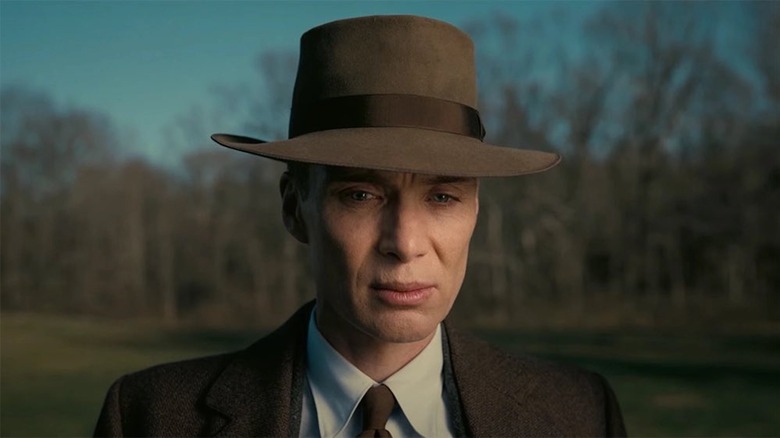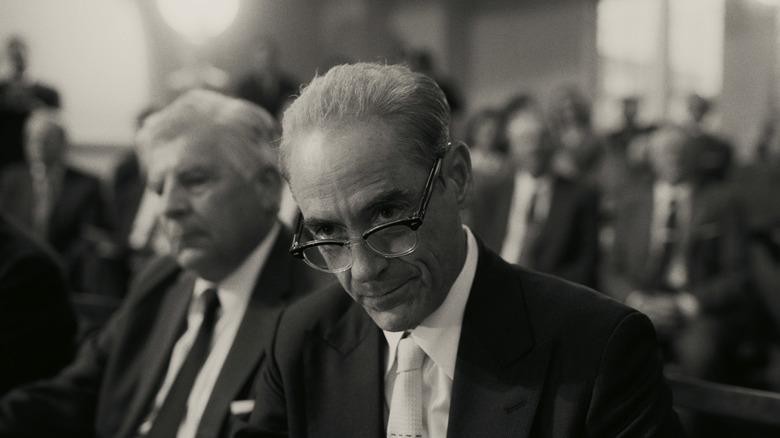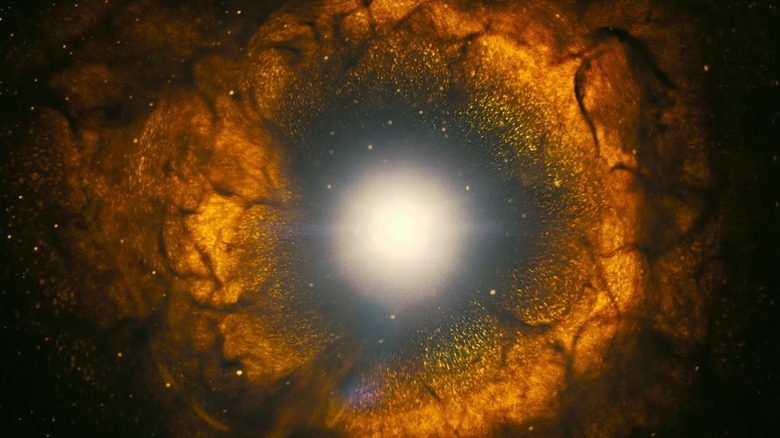Oppenheimer Review: Christopher Nolan & Cillian Murphy Are A Force To Be Reckoned With
- Historically, politically, and philosophically rich
- The middle hour is a perfect thriller
- Amazing performances from Cillian Murphy and Robert Downey Jr.
- Christopher Nolan is not good at writing romance
- A bit too long and hard to follow
Christopher Nolan's "Oppenheimer" has been sold as an event movie, a thriller about the making of the atomic bomb crafted with practical effects spectacle that demands to be seen on the biggest screen possible. The film is exactly that — for about an hour in the middle of its three-hour runtime. That hour spent in Los Alamos, New Mexico, is incredible, but this biopic casts its historical net a lot wider than just its subject's most infamous achievement. It's bigger in scope, yet more intimate in focus than you might expect.
All the stylistic traits you've come to expect from a Nolan blockbuster are there: complicated nonlinear timelines, grand IMAX cinematography, and an overpowering sound mix. What's different here is that all of these techniques are for the most part being applied to scenes of men sitting at tables having serious conversations. It's more like "12 Angry Men" or "The Social Network" than it is like "Dunkirk." And the subjects of those conversations might also come as a surprise to the less historically informed: there's some talk about the bomb, of course, but much more of the drama is dealing with McCarthyism, leftist politics, personal vendettas, and the nature of public forgiveness.
The result is a film stuffed to the brim with things to think about. Maybe it's a bit overstuffed, to the point it can be hard to keep track of everything if you don't seriously know your history. I suspect it might be easier to follow on repeat viewing, and as heavy as the movie is, it becomes gripping enough that many will want to see it twice. Even with the length and complexity on display in "Oppenheimer," Nolan is a director who knows how to hold an audience's attention, whether it's in a bomb test or a political hearing.
Stand-out leads in an enormous ensemble
The life of J. Robert Oppenheimer (Cillian Murphy) is framed via two different political hearings: one targeting Oppenheimer's security clearance in 1954, the other concerning the nomination of rival scientist Lewis Strauss (Robert Downey Jr.) as Dwight D. Eisenhower's secretary of commerce in 1959. The movie cuts back and forth between the different hearings, and then further back in time to the not-entirely-linear presentation of events discussed within those hearings. Oppenheimer's hearing and the recollections therein are filmed in color, while Strauss' side of the story is filmed in black and white.
Oppenheimer was a target of the Red Scare, and Strauss was responsible for targeting him. Oppenheimer, a self-described "New Deal Democrat," was never a member of the Communist Party, though many of his friends and loved ones were and he worked with Communists on such worthy causes as supporting the Loyalists in the Spanish Civil War and unionizing professors (relevant to the current Hollywood strikes). As a Jewish man, his participation in the Manhattan Project was driven by a personal understanding of the dangers Adolf Hitler posed — though Hitler ended up dying well before the bombs were dropped on Hiroshima and Nagasaki. Murphy excels at depicting Oppenheimer's overwhelmed nature, the impossibility of squaring all of his ideals and contradictions in the face of horrors he's responsible for.
Strauss' story of a petty grudge escalating into ultimately self-defeating vengeance doesn't have quite as many layers, but it's a delight to get to see Downey disappear into playing a real person again after over a decade stuck in an Iron Man suit. Beyond the two perspective characters, there are a ton of other great actors in this cast — basically, everyone in Hollywood who didn't get cast in "Barbie." The film serves up a constant stream of "Hey, it's that guy!" moments — both for those recognizing the actors and those recognizing the early 20th-century scientists and politicians they're playing.
As with many Nolan films, the roles for women aren't anything outstanding. On some level, that's built into the material; a historical film set in a historically hyper-masculine world generally isn't gonna focus on women. The bigger problem with the only two significant female characters being Oppenheimer's wife, Kitty Oppenheimer (Emily Blunt), and his girlfriend, Jean Tatlock (Florence Pugh), is that Nolan is simply bad at writing romance. Blunt at least gets one great acting showcase scene while being questioned in the hearing amidst all the biopic-standard "crying wife" scenes. Pugh, meanwhile, gets saddled with a sex scene that's so laughable you wouldn't believe me if I told you the dialogue.
Destroyer of worlds
As interesting as the material is, "Oppenheimer" takes a bit of time to really get going. Abstract flashes of the nuclear explosion early on in the film are attention-grabbing, but the nonlinear wide-ranging nature in the first act can leave you wondering when is the film finally gonna get to the main attraction. After Lt. Gen. Leslie Groves (Matt Damon) starts talking with Oppenheimer about the government's top-secret program, however, the storytelling gets more focused and suspenseful. The dual framing devices go away for longer and longer stretches — and when they do return in full force in the final act, we're a lot more emotionally invested.
I was not able to attend an IMAX screening (got the next best thing with a traditional 70 mm screening) and can only imagine how overwhelming some moments must be in Nolan's preferred format. I'm not even just talking about the Trinity bomb test (a masterwork of "how did they do that?" effects work). Many of the most visually stunning and disturbing scenes are smaller moments from Oppenheimer's subjective point of view, where cinematographer Hoyte van Hoytema evokes a next-level fusion of "Vertigo" and "The Tree of Life."
The personal and political conflicts between Oppenheimer and Strauss come together with the apocalyptic concerns of the protagonist's central accomplishment for an ending that will surely stick in your nightmares. Anyone attempting the "Barbenheimer" double feature is advised to take a significant breather between films to process it all.
"Oppenheimer" premieres in theaters on July 21.
This piece was written during the 2023 WGA and SAG-AFTRA strikes. Without the labor of the writers and actors currently on strike, the movie being reviewed here wouldn't exist.


